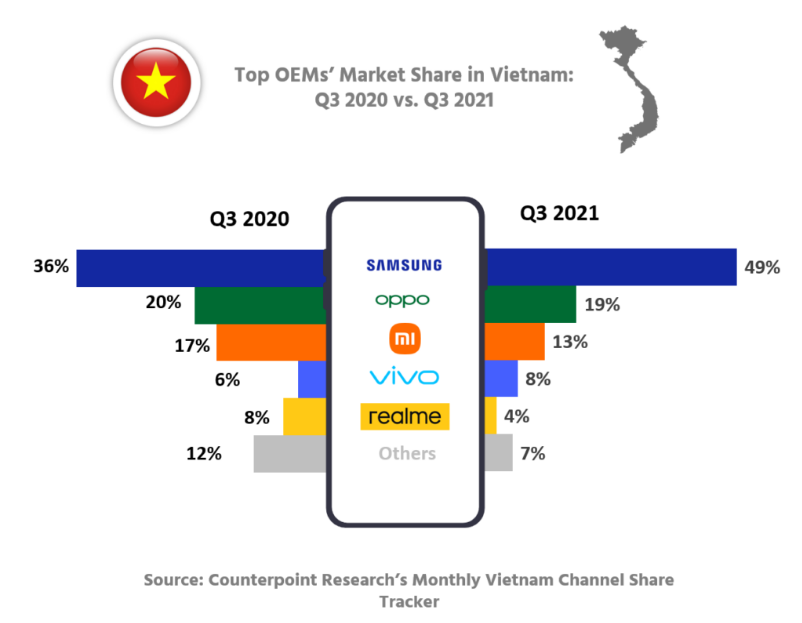The Vietnam smartphone market saw a massive 28% YoY drop in shipments in Q3 2021, mostly due to COVID-19-induced restrictions in major cities, which triggered labor shortages and closure of shops and malls. And on top of that, the ongoing global semiconductor shortage further resulted in limited volumes.
However, the market did perform well on a monthly level during July, but this saw a decline the very next month itself owing to the highest-ever spike in COVID cases.
Moving on to the brands themselves, Samsung performed extraordinarily well, reaching its highest ever share of 49% in Q3 2021. Most of its demand stemmed from budget offerings like the Galaxy A12, Galaxy A03s, and Galaxy A22 (via Counterpoint Research).

OPPO bagged the second spot with a 19% share, driven mostly by its A series. Xiaomi and vivo took the third and fourth spots with 13% and 8% shares respectively. For Xiaomi, its Redmi series was the driving force for its sales while the Y series did well for vivo.
Out of the total shipments, the online channel made up 13% during the same time period. Xiaomi led online sales with a share of 36% with Samsung closely following at 33%. This channel wasn’t spared by logistical issues either. To boost sales, OEMs partnered with online platforms to offer exclusive deals. Samsung, for example, partnered with Lazada for the fourth edition of LazMall Super Brand Day, where customers could avail savings at Samsung’s official store.
5G smartphones made up 20% of the total shipments in Q3 2021, and the figure is expected to rise further by 2021-end. 5G trials have already commenced in the country with Viettel becoming the first to do so. The carrier achieved a top speed of 4.7 Gbps during the trial. Auctions for the 5G spectrum are to start sometime in Q4 2021.
Regardless, manufacturing in Vietnam has been severely impacted by restrictions and lockdowns, affecting shipments of nearly every OEM. Most of the manufacturing facilities in Ho Chi Minh City during the restrictions were either closed or operating with limited manpower. As a result, some brands have even begun to look into setting up their factories elsewhere.
Still, smartphone shipments are expected to bounce back in Q4 2021 as restrictions are being lifted, workers have started returning to industrial towns, and vaccination rate is gaining momentum.
RELATED:
- MediaTek Dimensity 9000-powered smartphone to reportedly launch in February 2022
- Samsung retakes top spot from Realme in Philippines smartphone market in Q3 2021: Report
- Thailand smartphone sales see 14% YoY decline in Q3 2021 but 5G phone sales reach all time high
- Samsung will reportedly move part of its smartphone production capacity from Vietnam to India
- TV shipments may have seen YoY decline in 2021, but OLED TV sales see 72.8% YoY increase




